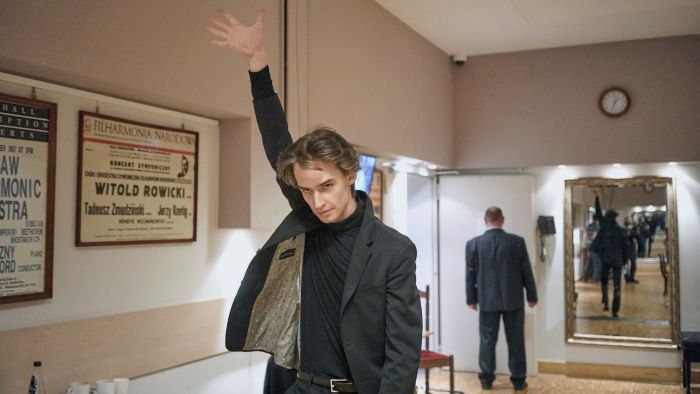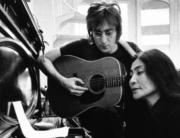![]() There is still life in the kids-in-competition documentary mini-genre, which was so prevalent years ago (Spellbound, Racing Dreams). In the case of absorbing Pianoforte, the gifted participants are not all exactly kids competing for the prestigious 2021 International Chopin Piano Prize in Warsaw. True, Hao, a high schooler from China, and Eva, a photogenic 17-year-old representing Russia and Armenia, are among the young pianists hoping to embark upon a performing career (and the 40-thousand-euro prize). By and large, though, the rest are young adults, including some who have been around the competition circuit a few times. Among the other hopefuls is Marcin from Poland, who, with his wild waves of hair, could pass as Beethoven or even Chopin from Central Casting.
There is still life in the kids-in-competition documentary mini-genre, which was so prevalent years ago (Spellbound, Racing Dreams). In the case of absorbing Pianoforte, the gifted participants are not all exactly kids competing for the prestigious 2021 International Chopin Piano Prize in Warsaw. True, Hao, a high schooler from China, and Eva, a photogenic 17-year-old representing Russia and Armenia, are among the young pianists hoping to embark upon a performing career (and the 40-thousand-euro prize). By and large, though, the rest are young adults, including some who have been around the competition circuit a few times. Among the other hopefuls is Marcin from Poland, who, with his wild waves of hair, could pass as Beethoven or even Chopin from Central Casting.
One doesn’t have to be familiar with Chopin’s oeuvre. Hearing his music played on the finest Steinways and Yamahas in a concert hall with great acoustics is enough to get anyone intrigued by the Polish composer’s music. Director Jakub Piatek follows seven participants through the competition’s four stages over the course of 40 days. However, his emphasis is not on who will win as much as on the drive and the incredibly intense concentration necessary to play, by memory, as technically flawlessly and emotively as possible. In the first stage, 80 participants are whittled down to 40 until only 10 perform for the final event. (The filmmakers had no idea of the fate of those profiled; not all make it to the final cut.) The pressure all seven feel is contagious.
What we are most privy to are the mental preparations during rehearsals and before performance, beginning with the teacher for Alex (standing in for Italy and Slovenia), giving him a gentle shoulder and arm massage as well as a pep talk. Other mentors are not as touchy feely, but much blunter, barking instructions or reacting with tough love, most notably Eva’s longtime teacher. On the other hand, the Chinese participant’s mentor, Vivian Li, maternally looks after the teen. Some assume upon meeting her she’s his mother—she has been his teacher since he was a child. In fact, more than 20 years ago, she had trained as a concert pianist, but dropped out of competing for the Chopin award, realizing that she did not have enough ambition.
Of all of the documentaries I saw at Sundance, this was the most tightly and sprightly edited, and that recognition would extend across all films, including the features. Piatek sets the tone immediately in a montage of the pianists testing out pianos on the stage before the competition begins. The compare-and-contrast edits of the players performing, whether in rehearsal or before the judges, continues throughout. And one must have a particularly well-trained ear to catch any flaws. In fact, Hao’s performance of a piece from Chopin’s Piano Concerto in E Minor, accompanied by the Warsaw Philharmonic Orchestra, brings two male audience members to tears.
Before the main event in Warsaw, the filmmakers began following the young musicians in their homes throughout the globe. (In the case of Michelle, from Italy, only her dog doesn’t complain about her banging the ivories.) All of them appear unguarded and at ease in front of the camera—it’s probably the least of their concerns. Leonora, also from Italy, nearly gushes in her interviews, and the rapport between subjects and the documentary crew goes both ways. When a musician doesn’t make it the finale and packs up to leave Warsaw, a single shot briefly captures the heartfelt farewell between the young pianist and the filmmakers. It’s the equivalent of a sad wrap party, here taking place in a hotel corridor.







Leave A Comment